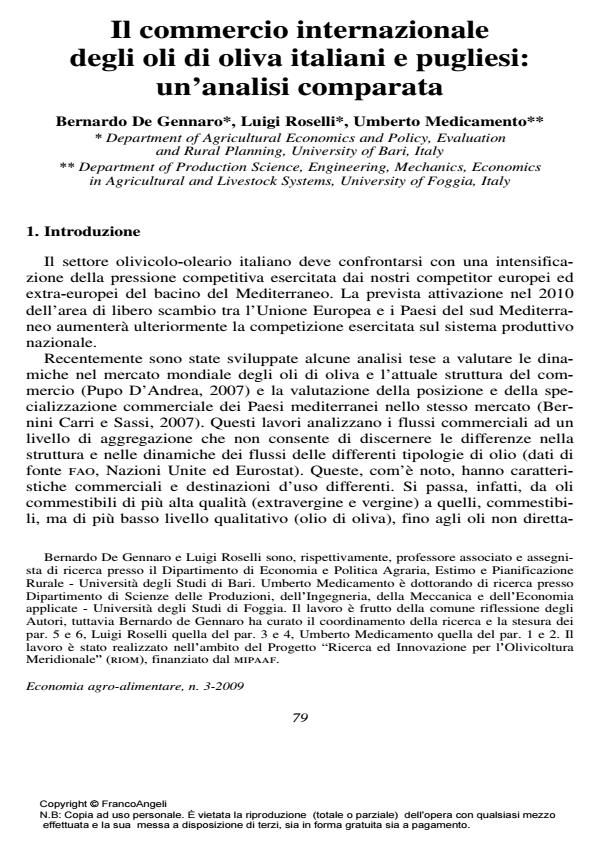Il commercio internazionale degli oli di oliva italiani e pugliesi: un’analisi comparata
Journal title ECONOMIA AGRO-ALIMENTARE
Author/s Bernardo De Gennaro, Luigi Roselli, Umberto Medicamento
Publishing Year 2010 Issue 2009/3
Language Italian Pages 23 P. 79-101 File size 934 KB
DOI 10.3280/ECAG2009-003005
DOI is like a bar code for intellectual property: to have more infomation
click here
Below, you can see the article first page
If you want to buy this article in PDF format, you can do it, following the instructions to buy download credits

FrancoAngeli is member of Publishers International Linking Association, Inc (PILA), a not-for-profit association which run the CrossRef service enabling links to and from online scholarly content.
The growing olive oil consumption recently raised the interest for the international olive oil trade, increasing the complexity of the market. Profits attracted multinational industries and corporations, whose interest crosses the National borders, influencing trade relationships. At the same time, international trade treaties resettled the map of exchanges, mainly under the influence of globalization and liberalization of markets. Consumers’ demand for quality rose almost worldwide. Market segmentation increased, and firms now can chose between different strategies. The ideal association of olive oil with the Mediterranean diet identifies the origin of the product with quality guarantee and expectations. These processes raised recently the value of denominations of origin. Several approaches have been used and tested to provide analytical tools able to unpack and to clearly summarize the dynamics of the olive oil international trade. Most of the studies are Country focused, exploring their perspectives and weaknesses, and estimating economic models. In this study we analyze the position of Italy and Apulia, an Italian region, within the olive oil international market. Apulia is one of the most important producing regions in the World; its position in the net of trade exchanges is therefore crucial to its success. The study compares Italian and Apulian performances along a 12 years time series, with respect to the three most important qualities of olive oil. Results exhibit that market structure globally changed, basically showing a higher foreign competition on lower quality olive oils. The two investigated areas differently reacted to changes. While Italy shifted its competitiveness toward higher quality olive oils and higher price solutions, Apulia lost competitiveness on the export of extra-virgin and virgin oils. At the same time Apulian import of extra-virgin olive oil increased, despite the surplus of supply.
Keywords: Olive oil market, international trade, competitiveness
Jel codes: F14, Q17
- Nutraceutical olive oil: does it make the difference? Leonardo Casini, Caterina Contini, Nicola Marinelli, Caterina Romano, Gabriele Scozzafava, in Nutrition & Food Science /2014 pp.586
DOI: 10.1108/NFS-09-2013-0102 - E-commerce retail of extra virgin olive oil: an hedonic analysis of Italian SMEs supply Domenico Carlucci, Bernardo De Gennaro, Luigi Roselli, Antonio Seccia, in British Food Journal /2014 pp.1600
DOI: 10.1108/BFJ-05-2013-0138 - The role of the economic crisis on the competitiveness of the agri-food sector in the main Mediterranean countries Maria CRESCIMANNO, Antonino GALATI, Tufan BAL, in Agricultural Economics (Zemědělská ekonomika) /2014 pp.49
DOI: 10.17221/59/2013-AGRICECON
Bernardo De Gennaro, Luigi Roselli, Umberto Medicamento, Il commercio internazionale degli oli di oliva italiani e pugliesi: un’analisi comparata in "ECONOMIA AGRO-ALIMENTARE" 3/2009, pp 79-101, DOI: 10.3280/ECAG2009-003005